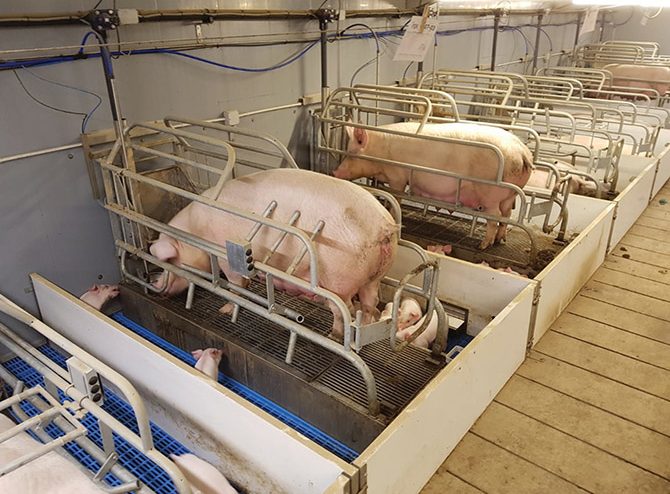
The trials and tribulations of making a livelihood as a pig farmer in Ireland in the current climate have been well documented but Dermot Healy is keeping the best side out. Along with his brother Joe, he runs Tullow-based enterprise JDH Farms Ltd and they are in it for the long haul.
Pig production in Ireland ranks third in importance behind beef and milk production accounting for 8% of Gross Agricultural Output.
Employment in the pig sector accounts for at least 1,300 labour units on farms, with the total number employed in associated sectors such as pig meat processing, feed manufacture, haulage and services being estimated at 8,300.
There are an estimated 290 commercial sow herds in Ireland and the June 2016 CSO Livestock Survey reported that there are 1.6 million pigs in Ireland, including 149,900 breeding sows.
Dermot Healy is a third generation pig farmer and runs Tullow, Co Carlow-based JDH Farms Ltd in partnership with his brother Joe. The Healy name has been synonymous with the pig industry down in the south east of the country for many a year now. Joe runs both Healy Pigs Ltd and Wexford Pig Development Ltd in Wexford.
Natives of Crosslow, Tullow, the piggery is located five miles away from the family home, in Leaney, Ardattin Village, to be precise.
“We started up JDH Farms in 2014,” Dermot – who is married to Mary and father of Niamh, Sarah and Michael – explained. “Our father Michael had pigs back in the early eighties but got out of them while Joe has been in pigs since 1982 and progressed up along the line.”
Dermot followed in his brother’s footsteps by attending Multyfarnham Agricultural College and went on to complete a Pig Management course in Athenry in 1998.
“There was an existing piggery here which we purchased off our older brother Eamon five years ago,” he added:
Currently farming 380 Large White Landrace Cross sows and supplying Dawn Pork & Bacon, Dermot and Joe have invested heavily in the early years of the business to ensure that their facilities are to the highest standard possible because the health and welfare of the pigs is of paramount importance to them.
The pig unit has been completely revamped and the end result is a modern facility which prioritises health and safety.
“The original unit housed 250 but we can now accommodate 380 sows due to expansion work we’ve undertaken in the last two years. It’s easy to work in and welfare friendly for man and beast.”
Consolidation is the name of the game now as Dermot, who has Martin Molloy working alongside him as well as his nephew John Healy on a part time basis, and Joe look to lay solid foundations for the future of the business.
“There are no immediate plans to expand but we’ll have to wait and see. We would like to go automated as much as we can and reduce labour on the manual end of things. We are producing good numbers and our aim would be to farm them as best as we can.”
To that end, they produce their own own feed utilizing a Big Dutchman mill and quality feeds equals healthy pigs. “Barley, wheats, maize and soya are the four main components and that helps us towards our aim of keepings costs under control,” Dermot outlined.
It’s a sensible strategy considering that pig farmers can struggle to secure a fair return from the marketplace. A rebalancing of power in the food supply chain is required, to deliver a viable price for farmers, and a return on their work and investment.
Up until recently pig prices ran below the cost of production but fortunately prices have improved although the uncertainty surrounding Brexit isn’t helping matters.
In 2016 Ireland exported an estimated 235,000 tonnes of pigment, worth approximately €615 million. The UK was the main Irish pigmeat market receiving 56% of our total pigmeat exports, 16% was exported to Continental EU and the remaining 28% went to international markets.
It will come as no surprise, therefore, to learn that Dermot is keeping a close eye on how Brexit pans out.
“Prices have improved recently but no one is quite sure what way the markets are going to go with Brexit. We have no choice but to keep going as we are and hope for the best,” he concluded.
JDH Farms Ltd
Leaney
Ardattin
Co. Carlow
Taken from Irish Tractor & Agri magazine Vol 7 No 3, June/July 2019